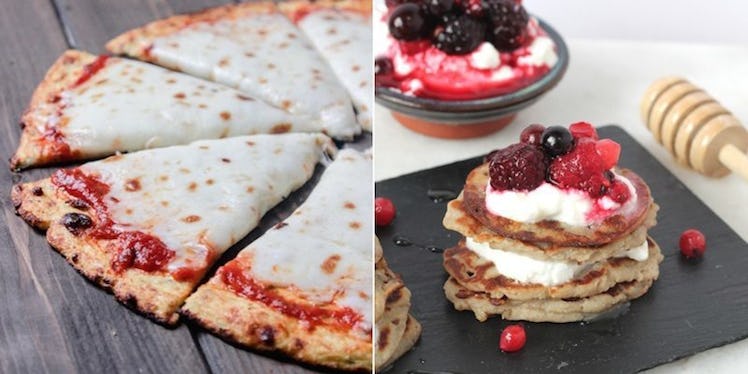Like many people, I have a serious love-hate relationship with carbs.
In fact, I'm pretty sure I like carbs more than I like most people, and if I wasn't afraid of only being able to fit into sweatpants, I would totally be on an all-carb diet with my girl, Regina George.
But, carbs are often considered to be diet enemy number one when it comes to staying slim.
In reality, carbs don't actually make you fat, they just end up with a bad rep for the the unhealthy calories, sugars and fats that can be hidden inside some types of carbohydrate-rich foods.
Carbs are important macronutrients your body uses as a primary source of energy to fuel the nervous system, so you need them to perform everything from cellular functions to physical activities like running or lifting.
The main thing is to realize not all carbs are created equal, so as long as you stick to the right proportions of healthy ones, it's actually possible to eat your beloved carbs without sabotaging your beach bod.
So then, how exactly do you differentiate between the good and the bad?
Let's start with the basics.
According to the the Dietary Guidelines for Americans, 45 to 65 percent of your daily calories should come from carbs. So if you're eating 2,000 calories a day, roughly 900-1,300 should come from healthy carbs.
Foods like fruits, grains, legumes, dairy and vegetables all contain carbohydrates. Carbohydrates can be further broken down into simple carbs like sugars, and complex carbs like starches and fibers.
Each source of carbohydrates can also be measured by it's position on the Glycemic Index, which is a scale of how fast the carbs you consume enter the bloodstream.
Refined grains and simple sugars such as those found in white bread, processed junk food and sweets are all high GI foods that rapidly enter the bloodstream.
These are the "bad carbs" that negatively affect insulin levels and contribute to weight gain, as well as an increased risk of diabetes and heart disease.
On the other hand, complex carbs like whole grains, legumes and vegetables enter the blood stream at a steadier pace.
These "healthy carbs" maintain steady blood sugar levels and are often loaded with other beneficial nutrients such as vitamins, minerals and fiber.
There are tons of ways to eat carbs without sacrificing all of your favorite foods, so we set out to find a bunch of healthy carb recipes that will let you indulge without the bulge.
Take a look at the pictures below to see healthy carbs you should be adding to your diet.
Whole Grains
Whole grain foods such as wheat, corn, rice, oats, barley, quinoa, sorghum, spelt and rye are all "good" carbohydrates that should be incorporated into your diet, as opposed to processed, refined grain.
Whole grains are great sources of fiber as well as vitamin B, selenium, potassium and magnesium.
Eating whole grains can also help to lower blood pressure, reduce the risk of inflammatory diseases and help you maintain a healthy weight.
Brownie Batter Overnight Protein Oatmeal
Whole Wheat Macaroni and Cheese
Buffalo Chicken Quinoa Salad
Coconut Banana Buckwheat Pancakes
Fiber-Rich Fruits
Fruits that are high in fiber and water content like apples, bananas, berries and pears are healthy carbs.
They contain natural sugars that will give you an energy boost, as well as a variety of antioxidants, vitamins and minerals.
Chia Berry Parfait
Berry Coconut Milk Ice Pops
Vegan Berry Crunch Smoothie Bowl
Berry Quinoa Salad
Fiber-Rich Veggies
Vegetables like broccoli, leafy greens, squash, sweet potatoes and asparagus are healthy carb choices that are low in fat and contain lots of vitamins, minerals and fiber.
With a few simple tweaks, you can even use veggies to replace the "bad" carbs in some of your favorite foods, like swapping out refined-flour pizza crust for cauliflower crust, or replacing pasta with zucchini noodles and spaghetti squash.
Cauliflower Crust Pizza
Zucchini Noodles with Pesto
Mediterranean Baked Sweet Potatoes
Cauliflower Crust Grilled Cheese
Beans and Legumes
Legumes like beans, peas and lentils are complex carbs that are high in protein and can even be used as a meat substitute.
They contain little sugar and are packed with folate, potassium, iron and magnesium as well as lots of fiber, which keeps you feeling full for longer.
Flourless Black Bean Brownies
Santa Fe Black Bean Burger
Spaghetti Squash Burrito Bowls
Quinoa White Bean Chicken Chili
